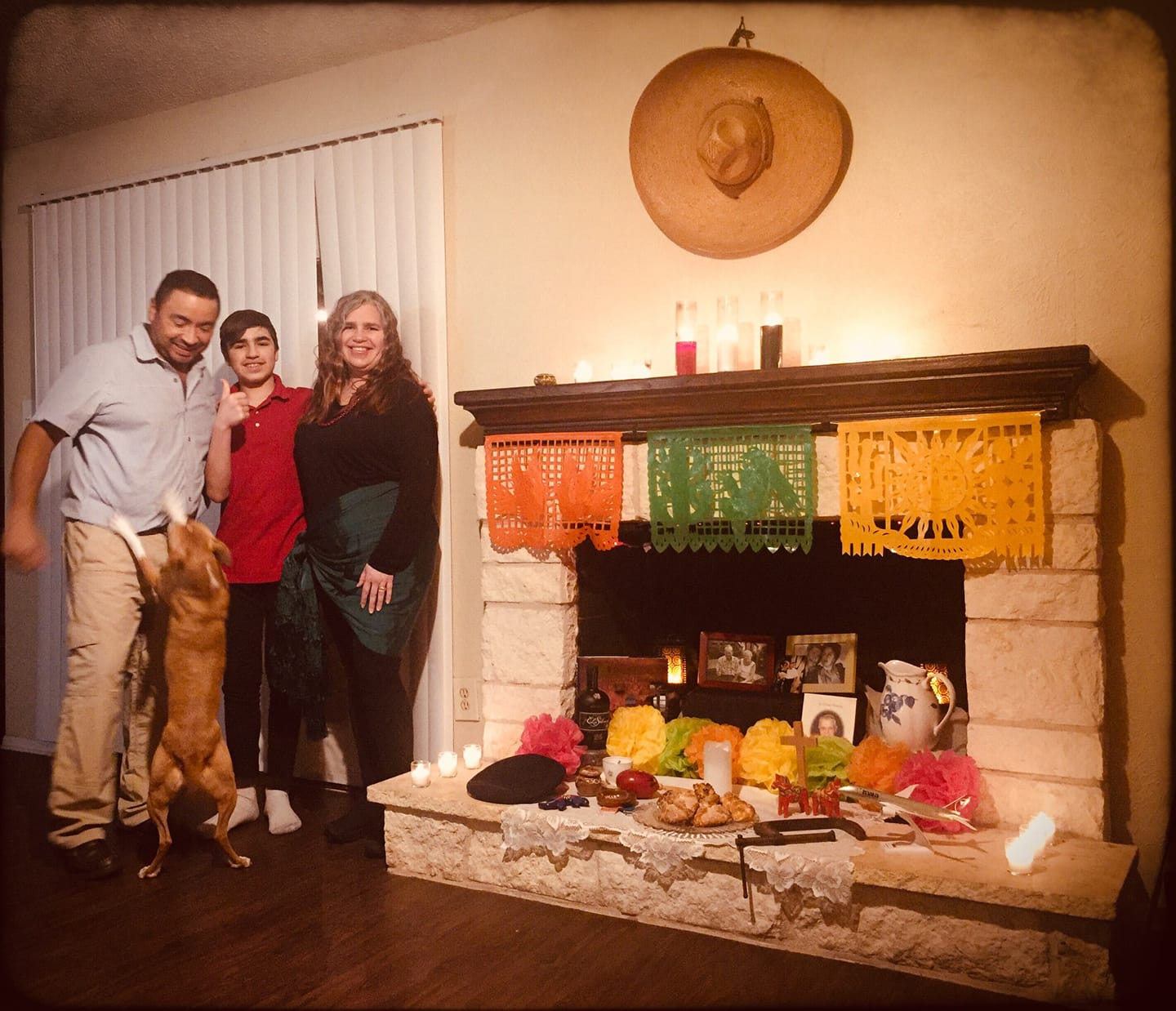“It is now 1985,” read my son, “and my grandpa will be seventy-eight years old. […] He tells of changes like horses to cars, steam trains to airplanes to space ships, steam engines to tractors, ice boxes to refrigerators, and wood heat to furnaces to woodheat again.” It was at this point of the reading that I grew teary-eyed, memories flooding back to me.
With Covid-19 cases on the rise, and my son having reached an age where he no longer expressed interest in trick or treating, we decided to forego Halloween and more fully embrace Día de Muertos. My husband is from Mexico, and although we have celebrated Día de Muertos in past years, I have to admit that we could have done better. That is to say, we want our son to have experiences and memories to look back on that help him maintain a connection with his diverse background.
And so, as we ate the traditional pan de muerto and drank hot chocolate in front of the ofrenda that we created, I asked my son to read an essay that I had written about my grandfather when I was in junior high. His reading of the essay brought back memories of sitting at the dining room table with my dad, pictures and clippings and files spread out, me with a notebook and him with a legal pad. My dad was a busy man, and his taking time to sit with me and dictate my grandfather’s history, stopping to offer side stories and showing deep interest in having me record it all with accuracy, well, it made me feel good. I also learned a great deal about my grandfather.
My grandfather spoke only Swedish until he was six years old, when he began attending school in 1913 at a one-room schoolhouse in the rural farming community where I, also, grew up. In his school other children spoke Swedish as well, and I remember my grandfather telling me that the teacher would teach in both Swedish and English. Later, when he transferred into the “town school” he was taught solely in English. What if he hadn’t been? What if nobody back in that time period was weaned from their native language and had instead continued their learning in both English and their first language?
Sixty years later, when I attended school in that same community, there were no remnants of teaching and learning in any of the Scandinavian languages prevalent in that area. I do remember hearing my grandfather and other older relatives speaking Swedish at family gatherings. Around my community there were people who spoke Norwegian, German, and Swedish. But it was mostly older people. To my knowledge, nobody in the community speaks the language of their elders anymore.
With language comes culture, and with culture comes language. There are words that exist for specific things from the culture to which languages are attached. There are ideas and beliefs that exist within certain cultures that are best expressed in those people’s native tongue. In this way, our language helps create who we are. When we prioritize one language over another, we are prioritizing one culture and one “way of being” over another.
Recently, in my grad school studies, we read extensively on the topic of the hegemony of English in the United States, and how, since the formation of the U.S., English has held a dominant position by all people in positions of power in this country. Although various languages were widely spoken around the country in the 18th and 19th centuries and they were used in the school and marketplace, they were not fully empowered as languages of education or commerce. By the time my grandfather attended school “in town”, bilingualism in schools had come to a near end in our country.
Let’s consider the Spanish language. Even though Spanish was widely spoken in the U.S. many, many years before English was, Spanish holds the inferior position in comparison to English as far as dominance is concerned. Even in the world of bilingual education, in the best dual language programs, English still has the ultimate power, because success is eventually measured by the students’ ability to succeed academically in English. The ultimate goal always seems to be focused upon the mastery of English.
Language has value and it represents people, but it also gives value and identity to things and to people. Ultimately, those who control which language we do business in, learn in, conduct our relationships in, control the masses. But this sort of power exists in large part due to people’s acceptance of there needing to be a language of power, whether unconsciously or purposely. Consider your own heritage. What language(s) did your ancestors speak?
There is a strong possibility that bilingualism could become the norm in the United States. If people continue to pass languages on from generation to generation, and if more educators acknowledge that hegemony of English does exist, we can begin to empower speakers of other languages, thereby encouraging people to not only maintain their cultural identities, but to share them with others.
Mis Antepasados Suecos, la Hegemonía del Inglés y el Día de los Muertos
“Ahora estamos en 1985”, leyó mi hijo, “y mi abuelo tendrá setenta y ocho años. […] Él habla de cambios como caballos a automóviles, trenes de vapor a aviones a naves espaciales, máquinas de vapor a tractores, cajas de hielo a refrigeradores y calor de madera a hornos para calentar nuevamente la madera “. Fue en este punto de la lectura que se me llenaron los ojos de lágrimas y los recuerdos me inundaron.
Con los casos de Covid-19 en aumento, y mi hijo ya de a una edad en la que ya no expresaba interés en pedir dulces, decidimos renunciar a Halloween y abrazar más plenamente el Día de Muertos. Mi esposo es de México, y aunque hemos celebrado el Día de Muertos en los últimos años, debo admitir que podríamos haberlo hecho mejor. Es decir, queremos que nuestro hijo tenga experiencias y recuerdos que recordar y que le ayuden a mantener una conexión con sus diversos antecedentes.
Y así, mientras comíamos el tradicional pan de muerto y bebíamos chocolate frente a la ofrenda que creamos, le pedí a mi hijo que leyera un ensayo que yo había escrito sobre mi abuelo cuando estaba en la secundaria. Su lectura del ensayo me trajo recuerdos de estar sentada en la mesa del comedor con mi papá, fotos, recortes y archivos esparcidos, yo con un cuaderno y él con una libreta. Mi papá era un hombre ocupado, y el tiempo que tomó para sentarse conmigo y dictar la historia de mi abuelo, deteniéndose para ofrecer historias paralelas y mostrando un profundo interés en que lo registrara todo con precisión, bueno, me hizo sentir bien. También aprendí mucho sobre mi abuelo.
Mi abuelo sólo hablaba sueco hasta los seis años, cuando comenzó a asistir a la escuela en 1913 en una escuela de una sola habitación en la comunidad agrícola rural donde yo también crecí. En su escuela, otros niños también hablaban sueco, y recuerdo que mi abuelo me dijo que el profesor enseñaba tanto en sueco como en inglés. Más tarde, cuando se trasladó a la “escuela de la ciudad”, se le enseñó únicamente en inglés. ¿Y si no lo hubiera sido? ¿Qué pasa si nadie en ese período de tiempo fue destetado de su idioma nativo y en cambio continuó su aprendizaje tanto en inglés como en su primer idioma?
Sesenta años después, cuando asistí a la escuela en esa misma comunidad, no había restos de enseñanza y aprendizaje en ninguno de los idiomas escandinavos que prevalecían en esa área. Recuerdo haber escuchado a mi abuelo y otros parientes mayores hablar sueco en reuniones familiares. En mi comunidad había personas que hablaban noruego, alemán y sueco. Pero en su mayoría eran personas mayores. Que yo sepa, ya nadie en la comunidad habla el idioma de sus mayores hoy en día.
Con el idioma viene la cultura y con la cultura viene el idioma. Hay palabras que existen para cosas específicas de la cultura a la que se asocian los idiomas. Hay ideas y creencias que existen dentro de ciertas culturas que se expresan mejor en la lengua materna de esas personas. De esta manera, nuestro lenguaje ayuda a crear quiénes somos. Cuando damos prioridad a un idioma sobre otro, estamos dando prioridad a una cultura y una “forma de ser” sobre otra.
Recientemente, en mis estudios de posgrado, leímos extensamente sobre el tema de la hegemonía del inglés en los Estados Unidos, y cómo, desde la formación de los Estados Unidos, el inglés ha ocupado una posición dominante por parte de todas las personas en posiciones de poder en este país. . Aunque varios idiomas se hablaban ampliamente en todo el país en los siglos XVIII y XIX y se usaban en la escuela y el mercado, no estaban plenamente habilitados como idiomas de educación o comercio. Para cuando mi abuelo asistió a su segunda escuela “del pueblo”, el bilingüismo en las escuelas había llegado casi a su fin en nuestro país.
Consideremos el idioma español. A pesar de que el español se hablaba ampliamente en los EE. UU. muchos, muchos años antes que el inglés, el español ocupa una posición inferior en comparación con el inglés en lo que respecta al dominio. Incluso en el mundo de la educación bilingüe, en los mejores programas de dos idiomas, el inglés sigue teniendo el poder supremo, porque el éxito se mide eventualmente por la capacidad de los estudiantes para triunfar académicamente en inglés. El objetivo final siempre parece estar centrado en el dominio del inglés.
El lenguaje tiene valor y representa a las personas, pero también da valor e identidad a las cosas y a las personas. En última instancia, aquellos que controlan en qué idioma hacemos negocios, aprendemos, conducen nuestras relaciones, pues controlan a las masas. Pero este tipo de poder existe en gran parte debido a que la gente acepta la necesidad de un lenguaje de poder, ya sea de manera inconsciente o intencional. Considere su propia herencia. ¿Qué idioma (s) hablaban sus antepasados?
Existe una gran posibilidad de que el bilingüismo se convierta en la norma en los Estados Unidos. Si las personas continúan transmitiendo idiomas de generación en generación, y si más educadores reconocen que la hegemonía del inglés existe, podemos comenzar a empoderar a los hablantes de otros idiomas, alentando así a las personas no solo a mantener sus identidades culturales, sino a compartirlas con otros.



